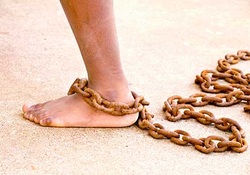
"Should you ever reach the point of truly facing what you have done, the guilt will be crushing. And that is what makes the Gospel of Christ so sweet. Because it extends grace and hope and mercy where none should be found and it will be there for you."
She added: "I pray you experience the soul crushing weight of guilt so that you may someday experience true repentance and true forgiveness from God which you need far more than forgiveness from me, though I extend that to you as well."
How could she make such a courageous and Christ-centered statement to her abuser and the world?
Making God "my light"
Rachel Denhollander has clearly experienced what every believer facing great pain can know: "The Lord is my light and my salvation; whom shall I fear? The Lord is the stronghold of my life; of whom shall I be afraid?" (Psalm 27:1-2).
To choose God as "my light" means that I choose not to live in the dark or try to walk in light produced by my capacities or those of others. This is a humbling decision, an admission that I need God's light and can trust it above any other.
Of course, making God "my light" does not exempt me from darkness. In David's psalm, triumph is followed immediately by tragedy.
His next verse: "When evildoers assail me to eat up my flesh . . ." (v. 2). And the next verse: "Though an army encamp against me . . ." (v. 3). He even states that "my father and my mother have forsaken me" (v. 10). In addition, "false witnesses have risen against me, and they breathe out violence" (v. 12).
Nonetheless, David knows that his enemies will "stumble and fall" (v. 2) and his "head shall be lifted up above my enemies all around me" (v. 6). Though his parents have forsaken him, "the Lord will take me in" (v. 10).
Why? Because he has chosen to make the Lord "my light." He has chosen to stay close to his Source, to live by his word and will, to stay out of the dark and in the light of his presence.
Why to make God "my light"
Why should we do the same?
Consider this promise: "If we walk in the light, as [God] is in the light, we have fellowship with one another, and the blood of Jesus his son cleanses us from all sin" (1 John 1:7).
According to C. S. Lewis, a Christian "does not think God will love us because we are good, but that God will make us good because He loves us; just as the roof of a greenhouse does not attract the sun because it is bright, but becomes bright because the sun shines on it."
One of the hymns I learned as a teenager promises,
When we walk with the Lord in the light of his word,
what a glory he sheds on our way!
When we do his good will, he abides with us still,
and with all who will trust and obey.
As we stay in the light, others are drawn to the light we reflect.
How to make God "my light"
An elderly man walked to his church every morning and sat quietly in the sanctuary for hours. One day his pastor asked him what he did during those long hours of silence. He said, "I look at God and he looks at me, and we tell each other that we love each other."
The secret to making God "my light" is spending time in his light.
Mother Teresa authored one of the most profound statements I've ever read on our subject. I invite you to read her words reverently:
We need to find God, and He cannot be found in noise and restlessness. God is a friend of silence. See how nature-trees, flowers, grass-grow in silence. See the stars, the moon, the sun, how they move in silence. . . .
The more we receive in silent prayer, the more we can give in our active life. We need silence to be able to touch souls.
The essential thing is not what we say, but what God says to us and through us.
All our words will be useless unless they come from within. Words which do not give the Light of Christ increase the darkness.
Rachel Denhollander's words gave the light of Christ. Will yours do the same today?
This post was written by Jim Denison of The Denison Forum. You can find his original post here: mailchi.mp/denisonforum/dailyarticle2018129?e=7af1b98df0









 RSS Feed
RSS Feed